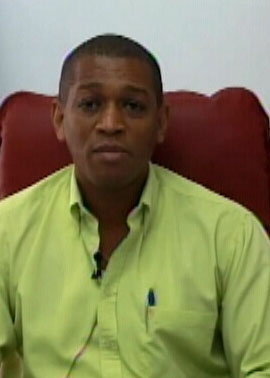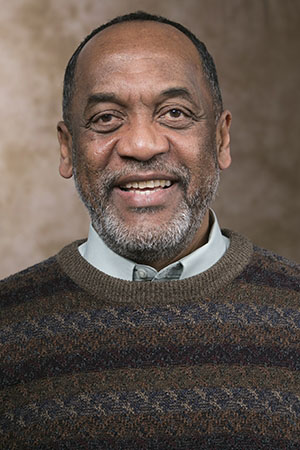Pledging unyielding protection of the environment, newly-appointed head of the Environmental Protection Agency (EPA) Dr Vincent Adams says that oversight of the oil and gas sector will be of a high quality and there will be no compromise with companies on environmental standards.
In an interview with Stabroek News last week, Adams disclosed that the EPA and the Department of Energy (DoE) will be collaborating to review and analyse all oil and gas Environmental and Social Impact Assessments (ESIA), with external expert help if needed. He emphasised that those reviews will in no way be influenced by the proposed work schedules or plans of any company.
“The schedule of no company is going to drive our mission. We are not going to give low quality work and reviews to create any risks to the environment, for the people of this country,” Adams declared.

“The mantra under which I worked and was taught everything I know [at the United States Department of Energy], is that health, safety and the environment can never be compromised, ever, and that is, by definition, what the EPA stands for. So in terms of reviewing these documents, we may not have in-house expertise but I am going to do whatever I can, and Dr Bynoe [DoE Head Dr Mark Bynoe] has said to me that we both know that we owe it to the people of this country to ensure that whatever reviews are done, that those are done to international standards. So whether we have to go out there and get consultants or whatever, we will ensure that quality and the interest of the people are priority,” he said.
During a three-day capacity-building workshop, aimed at improving industrial safety and environmental regulation of the oil sector, last week, Adams and Bynoe had discussions regarding the work of the two agencies in preparation for the emerging oil and gas sector.
Adams explained that while he and Bynoe have not yet had structured agency-to-agency meetings, they both agreed that they have to pool their resources to prepare for effective oil and gas oversight.
“We have agreed to work together, to support each other, to make sure that we sing from the same music sheet. Say for example, when material comes over and when we have to do reviews, we are going to be working together so that we have a single government position,” the petroleum engineer with over three decades of experience, explained.
Further, he added, “I am really looking forward to working with him and have expressed that to him. We are supposed to be meeting very soon. It is going to be a major plus in terms of us working together, in terms of his organisation’s needs, and for the EPA’s, where we supply the needed environmental support services. The DoE will be responsible for managing the contracts and being responsible for the operations, but in doing that, you need the environmental piece of it and that is extremely important. For every barrel of oil that is produced, there is an environmental safety component of that, every barrel.”
Underscoring the importance of rigid oversight of environmental protection practices for a sector such as oil and gas, he pointed to the consequences, sometimes fatal, when there is an iota of laxity.
“Safety in oil and gas work is like flying a plane; there is no room for error or the result can be fatal. If you do not perform or work in a safe way, you must know the results. Just look at the Deepwater Horizon spill. Every single accident can be avoided, and it is our duty to ensure that from our oversight perspective, those companies are in compliance to our rules and laws. We have to hold companies to the mantra and belief that every single accident is avoidable. I have never seen an accident occurred where, after an investigation, a report stated ‘You know, this accident just had to occur’. There is always a reason why accidents occur, and it is for that mitigating reason, that you put barriers and safeguards, and they must work according to them,” he said.
“The real issue is that you cannot work in an unsafe environment producing oil. The operation is going to be shut down. The shutdown is not the main issue because in unsafe work environments such as offshore, the repercussions are too many to risk; you have pollution of water and a polluted oceanic system, killing of fishes, damage to beaches…The BP spill and Exxon Valdez are lessons to learn from,” Adams said even as he urged citizens to watch the documentary ‘Spiral to disaster’. The documentary tells of the events leading up to the 1998 Piper Alpha North sea disaster where an oil platform exploded, killing 167 persons.
“Can you imagine 167 of 222 persons died in that disaster? That is why environmental health and safety is a component in the oil and gas sector; that you must, you have to ensure that every barrel of oil you produce has to be in a safe and sound environmental manner. Every process, drilling, production…whatever, safety and environment matters,” he added.
But having ample resources, both human and otherwise, has been a setback for the EPA and other agencies. The limitations, Adams says, he is fully aware of but does not believe that the EPA’s or DoE’s work would be substandard because of it.
No compromise
“Setting up a regulatory environment and having that enforcement takes time, but it is not like nothing exists. There is the EPA Act of 1996 and the Mining Act of 1989. Where we don’t have oil and gas guidelines of our own in certain areas here, there are global standards and regulations we can work with. In the meantime, we have to set up our own. Where we need expertise, we can outsource even as we build capacity. It is not too late and we will start.
“Do you know in the U.S., a lot of times we did not have the specific expertise either but we went out there and hired specialised companies to do our reviews on behalf of the government? I don’t see it as being much different here. I know that Dr Bynoe feels that same and exact way as he is not going to compromise health, safety and the environment, and from what I know of his work, I know that he means that. All operations will be conducted safely. Again, I say, schedules and companies’ projections are not going to drive our mission. We are not going to give low quality work and reviews to create any risks to the environment. So know for sure that the EPA, and I think I can say for DoE, that we will not be driven or compromised by the schedule of any company. No compromise, none. Where there are environmental laws and standards, we are going to ensure those are met,” he declared.
Adams is grateful for countries, such as Mexico, that are helping with environmental programmes to help Guyana prepare for an oil and gas sector.
He said that he is already working to forge relationships with companies and interested stakeholders to facilitate internships and hands-on specialty training for staff of the agency. Already, the Mexican Embassy has promised to take one employee on a four-week internship programme in Mexico to work with their oil and gas oversight agency. There, that person will be given the opportunity to visit rigs and see the daily activities involved in monitoring of the oil and gas sector.
And last Thursday, a representative of the World Bank, and not the Inter-American Development Bank as reported in the Sunday Stabroek, also indicated to him that organisation’s interest in partnering with the EPA for training and other development programmes.
Adams believes that the collaboration between the EPA and DoE to tackle environmental issues would go a long way in ensuring that Guyana’s citizenry are edified. He said that it would also assure them that the agencies are prepared to deal the emerging sector and that their government have their health, safety and overall best interest, at heart.
He said contrary to what has been stated by one commentator, he is in his mid-60s, and not 70s, and he knows there is still much knowledge to transfer.
“Let it be known that Dr Bynoe and I plan to work together and there is no animosity on either part.
‘Born and bred’
“I was born and bred here. My formative years, I spent here, and I became who I am because of the grounding I got here in Guyana. From the first grade right through to the University, my schooling was free, fortunately. My hands were held by teachers; in other words, I got a lot out of Guyana, a lot that I am eternally grateful for. Even when I was abroad and my physical being was there, my heart and soul was here and it was why I returned annually, sometimes more than once, to give back. I think everyone that knows me, know this,” he said. Adams had been returning to Guyana annually on medical and other missions with foreign volunteers, focused mostly in Linden.
“Having had a successful career, handing billion-dollar programmes for the U.S, I think I should share my experience here. So after I retired, I started coming back more frequently and was working with the University of Guyana to help develop the Faculty of Engineering and now, soon they will have a petroleum engineering programme. I saw this position advertised and said, here is an opportunity, and knowing that environment matters, more so now in an oil and gas sense, and we have limited capacity, I took it.
“What is the use of having retired from working at one of, if not the biggest bureaucracies in the world and just sit and keep all that knowledge and experience? Life is about sowing back into the world, giving back, making a difference, and that is what I want to do. I know I can help my country in this whole ‘building of capacity’ and I believe that if I start, others will also follow. I see my number one personal priority [as helping] to develop people. I have told my staff this. Don’t see me as coming here to take up a career…I have had that already, it is about building them, inspiring them to be the best they could be,” he said.





